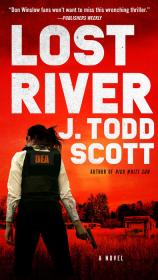Lost River
Review
Lost River
J. Todd Scott is rapidly carving out a name for himself as a go-to thriller author who guarantees a violent, wild ride into the world of the criminal drug trade and all its incarnations. His Chris Cherry trilogy was a gritty modern western set on the Texas border. His latest novel, LOST RIVER, takes place in a different locale with new characters, but in many ways is his best and most insightful work to date.
The setting is rural Angel, Kentucky. Casey Alexander, who is assigned out of the Charleston, West Virginia, DEA office, and her partner, Terry Van Dorn, let things spin out for a while, introducing readers to the flora and fauna of the area, including a number of unforgettable characters on either side of the law. It isn’t always clear where some of these individuals reside, or if they straddle both sides depending on their situation, but the definite bad guys belong to an extended crime family known as the Glassers.
"This is a grim, dark tale that focuses on the effect of the opioid scourge among the rural poor and working class of Appalachia.... LOST RIVER resonated with me, and I suspect it will for you too."
“Little Paris” Glasser is the first among equals of this group, a short-statured demon who controls the opioid trade in the small fiefdom he has carved out for himself. The depths of his depravity are still being fully plumbed as the novel reaches its conclusion. Alexander and Van Dorn aren’t introduced until the proceedings are well underway, the occasion being the massacre of (almost) the entire Glasser family by persons (initially) unknown.
Van Dorn is the older of the pair, and while he carries some baggage, he doesn’t hold a candle to Alexander. This doesn’t stop her from giving more than a flying fig about the people she encounters who are directly and indirectly affected by the opioid plague in the area, particularly a young medical transport assistant named Trey Dorado, who struggles to do the right thing (or something close to it), despite being ill-equipped to handle the multiple personal and professional burdens.
Alexander and Van Dorn attempt to follow an evidentiary trail that has been smoothed over by some of the folks who are supposed to be helping them. It is ultimately Alexander’s refusal to color within the lines that enables them to establish the motive for the mass murders and the catalyst behind them, even as the life of an innocent hangs in the balance during the apocalyptic conclusion.
This is a grim, dark tale that focuses on the effect of the opioid scourge among the rural poor and working class of Appalachia. Scott notes in his Acknowledgments that while the book is fiction, it draws from real-world happenings. The startling aftermath of one catastrophic event seems to be modeled after a similar occurrence that took place 90 minutes from where I sit typing these words. LOST RIVER resonated with me, and I suspect it will for you too.
Reviewed by Joe Hartlaub on June 25, 2020




